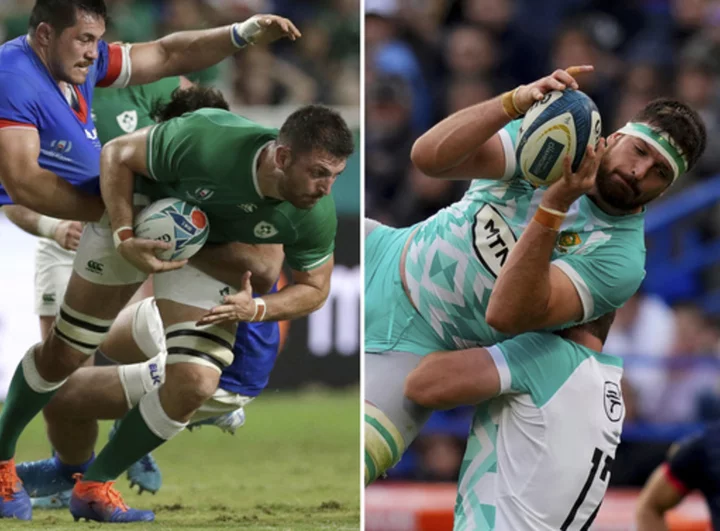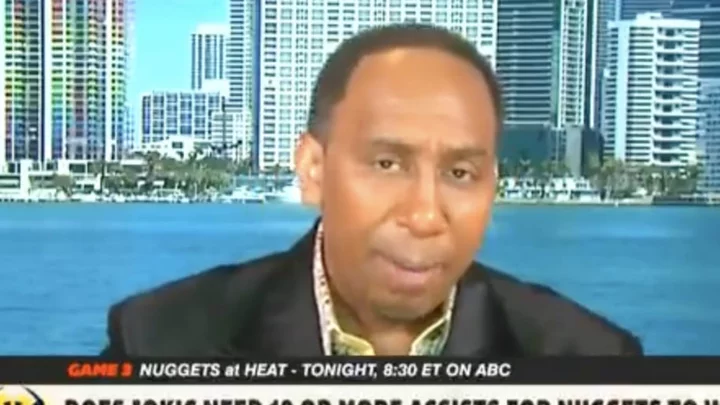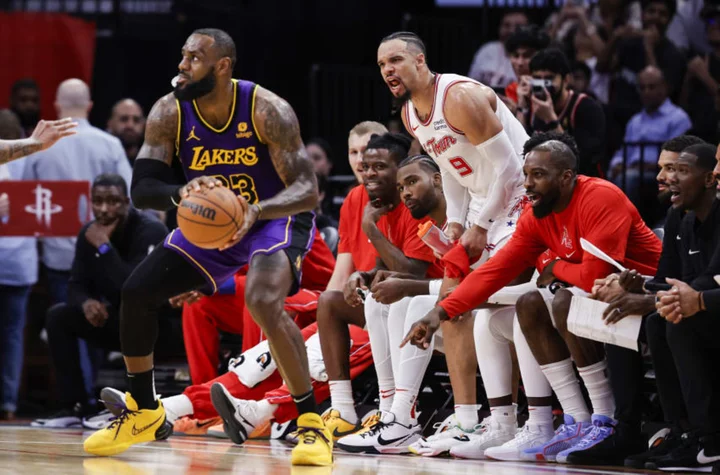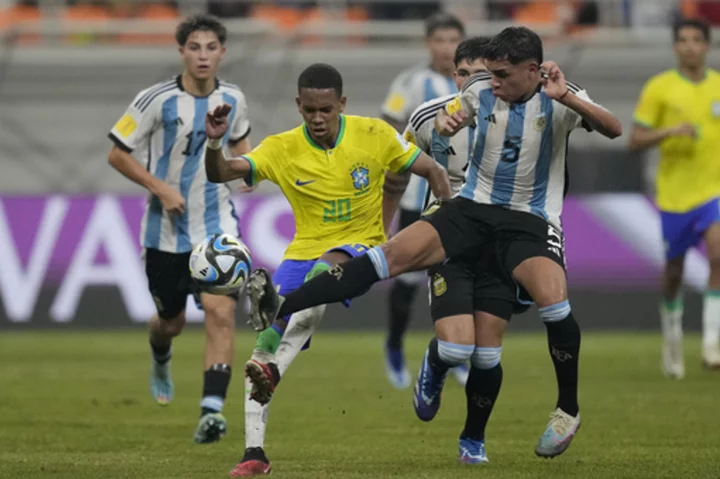Jeff Toomaga-Allen's All Blacks test career lasted 12 minutes.
The tall tighthead prop was a late replacement in 2013 as New Zealand beat Japan 54-6 in Tokyo. In his brief action, Toomaga-Allen made four tackles, propped up three scrums, and forced a turnover. But low in the All Blacks pecking order, he didn't reappear until four years later, in two low-profile tour games.
Summoned once more in 2018, a hamstring issue ruined that chance. With nothing left to prove, Toomaga-Allen moved to Britain for better pay, convinced his international rugby days were gone at age 27.
Then in late 2021, World Rugby surprisingly relaxed the eligibility rules. Anyone with a strong connection to a country other than the one they've already represented, and who hasn't played test rugby in three years, could change teams.
Quality tighthead props are highly sought after and Toomaga-Allen was thrilled last year to be claimed by Samoa — his mother's homeland. He scored his first test try in a win over Romania.
“If you're the best at the time and you're available to play for that country, why not?” Toomaga-Allen said. "It makes everyone else better.”
That's what World Rugby had in mind. Since the game went professional nearly 30 years ago, only twice in Rugby World Cup history have tier-two teams reached the quarterfinals: Fiji in 2007 and Japan in 2019.
At least 16 players who have taken advantage of the law change have been picked for the World Cup in France. South Africa, Wales and Scotland have one each. Four lower-rated teams the law was targeted for have also benefited: Tonga and Samoa have 11 former All Blacks and Wallabies, Namibia has ex-Australia flanker Richard Hardwick, and Romania a former Moldova prop, Gheorge Gajion.
SUCCESSFUL FORMULA
When it came to voting on the change, World Rugby had to be mindful of how a similar move in rugby league, the 13-a-side game, made their international matches more exciting. The International Rugby League allowed qualifying players to pick tier one and two teams that they could switch between. Tonga then reached the Rugby League World Cup semifinals for the first time in 2017. In 2022, Samoa became the first finalist in 54 years from outside Australia, New Zealand or Britain.
Tonga and Samoa aren't expected to make a similar splash in the 15-a-side World Cup, but their new transfers help them level the playing field, as the governing body hoped. The amended law also rectifies in a small way decades of disregard for the Pacific Island countries.
Tonga, Samoa and Fiji are pipelines of gifted players but have suffered in international games without access to commercial competition. Super Rugby broke a promise to include Samoa when it went professional in 1996 and none of the three islands were included separately until the Fijian Drua last year.
With meager money for their own domestic competitions, the islands have had their talent drained by Europe, Japan, Australia and New Zealand. More than 150 players from the countries played in Europe last season, more than 70 from Fiji alone. Those club contracts have then often blocked the Pacific players from joining their national teams.
“There's definitely that view that this is a Pacific Island measure. It’s not,” World Rugby CEO Alan Gilpin told the BBC. "Because they've produced this incredible rugby talent over a long period of time they are going to benefit from players going back. This is ultimately something that the game as a whole has supported.”
Tonga had to select amateurs to face New Zealand two years ago and lost 102-0, but has drawn ex-All Blacks Charles Piutau, Malakai Fekitoa, Vaea Fifita, George Moala and Augustine Pulu and former Wallaby Adam Coleman. Injured and unavailable was Wallabies great Israel Folau.
“This is a different class of side compared to teams we have had in the past, and ... it provides us with some massive x-factor,” Tonga coach Toutai Kefu said.
Samoa attracted former Wallabies Duncan Paia’aua and Christian Leali’ifano, and former All Blacks Lima Sopoaga, Steven Luatua, and Charlie Faumuina.
“We don’t have a lot of resources in the islands but this is one small change we can tap into,” Samoa coach Seilala Mapusua said. “It does go a long way in terms of strengthening our team.”
Fiji coach Simon Raiwalui wasn't in favor of the law change but still gave a World Cup shot to former All Black midfielder Seta Tamanivalu. Fiji has enviable depth, though, thanks to the Super Rugby success of the Drua, which has supplied 18 of the 33-man World Cup squad.
REVERSING TREND
South Africa voted against the move yet still called up lock Jean Kleyn, who'd qualified for Ireland on residency and was capped five times in 2019. Kleyn helped Munster win the United Rugby Championship final against his former South African team the Stormers in May, and made his Springboks debut in a July win over Australia.
“It was a great honor to play for Ireland but I didn't grow up as a young boy watching (Ireland lock) Paul O'Connell play rugby thinking, ‘Jeez, I want to play in his jersey.’ I was watching Bakkies Botha run around smashing guys and thinking, ‘One day, one day,’” Kleyn told the Afrikaans newspaper Rapport. “It's very much a childhood dream coming true.”
Injuries and poor form diminished former Wallabies No. 8 Jack Dempsey's enjoyment of the game so he left Manly Beach for Loch Lomond in 2021. He qualified for Scotland through a grandfather and moved before the law change. The welcoming Scots “re-lit that fire inside me” and they resurrected his test career in November against the Wallabies, all of whom he knew. Playing old mates, he said, felt "very strange."
“I came over here thinking my test career was probably over,” Dempsey said. “I certainly didn't come over here specifically to play test rugby because at that point the rule didn't exist. So, it was a bit of a curveball."
EVOLVING RULES
The further back in time you go, the looser were the eligibility rules. In the amateur era, players could switch countries if they had birthright or family heritage. Michael Jones, Pat Lam, Frank Bunce and Stephen Bachop played for Samoa in the 1980s before New Zealand. Lam and Bachop even switched back to Samoa. When that rule was abused, players in the early 1990s were made to stand down for three years before switching test teams.
Professionalism in 1995 changed things again. Countries with limited resources went shopping for players: Scotland recruited ‘Kilted Kiwis’ who gave up dreams of playing for the All Blacks.
The scandal known as Grannygate in early 2000 blew up when Wales discovered New Zealanders Shane Howarth and Brett Sinkinson were ineligible, as did Scotland after giving prop Dave Hilton 41 caps.
After that, representative players were tied to one national team. A tiny crack in the rules opened when rugby regained Olympic status in 2016 and had to comply with IOC rules. But test players were still ‘one and done.’ The market was big for non-test players who could qualify for a new country after three years of residency.
At the 2019 World Cup in Japan, 17 of the 20 teams selected players from different countries. The host team featured naturalized Tongans, Samoans, New Zealanders, Australians, South Africans and one South Korean, and reached the quarterfinals for the first time. Japanese treated them like celebrities.
THE WINNING ARGUMENT
But that didn't placate many, notably former World Rugby vice-chairman Agustin Pichot. He led an effort to “protect the integrity, ethos and stature of international rugby” by making it harder to switch countries by extending the residency rule from three years to five. That rule was to start at the end of 2020 but it was suspended because of the COVID-19 pandemic.
Bill Beaumont won a second term as World Rugby chairman in 2020 by beating Pichot, in part by pledging to streamline the eligibility rules.
The main argument against the move was a potential blow against development programs. What was to stop a tier-two player aiming for a big team knowing they could return ‘home?’
The motion in late 2021 needed a 75% majority vote. It got 76%.
Charles Piutau was relieved. Seven years after his last All Blacks test in 2015 at age 23, he debuted for Tonga in July last year. He didn't believe the law change threatened test rugby's integrity.
“When you've got two cultures that are close to your heart, how can you just say that this one's going to be the only one?” he posed to the BBC. "Both my parents were born in Tonga, then migrated to New Zealand. Two of my older siblings were born in Tonga and the rest of us were born in New Zealand. My parents' first language is Tongan so at home I would communicate in Tongan, and having my brother playing for Tonga, captaining Tonga, there's always a close connection.”
___
AP rugby: https://apnews.com/hub/rugby









